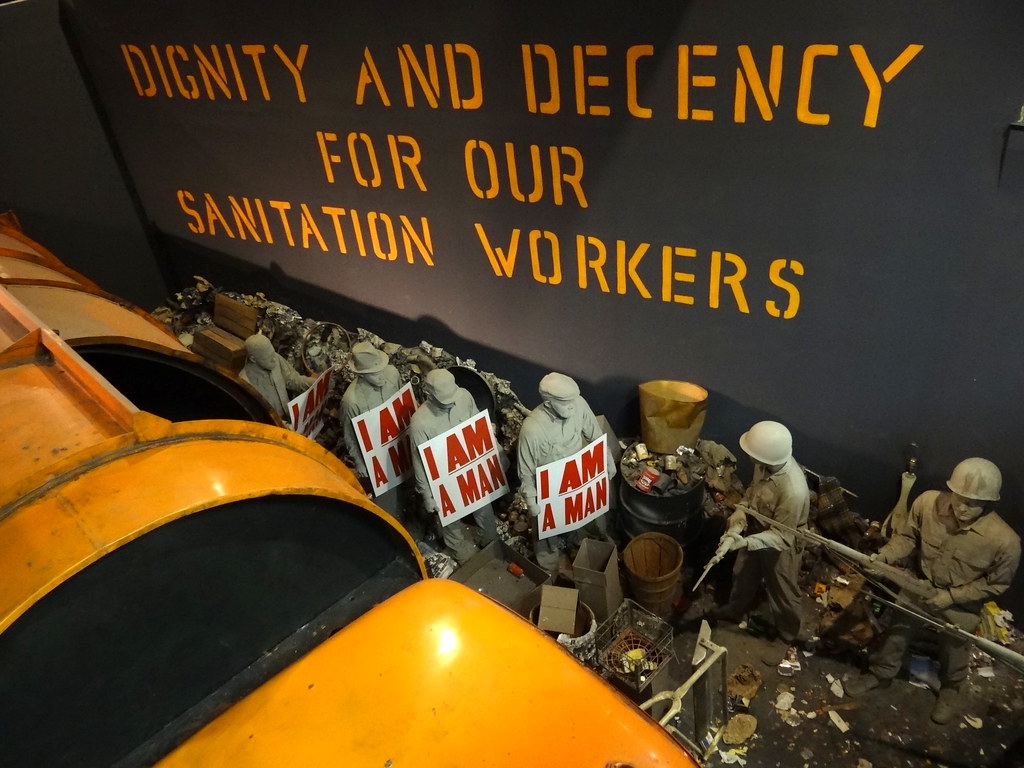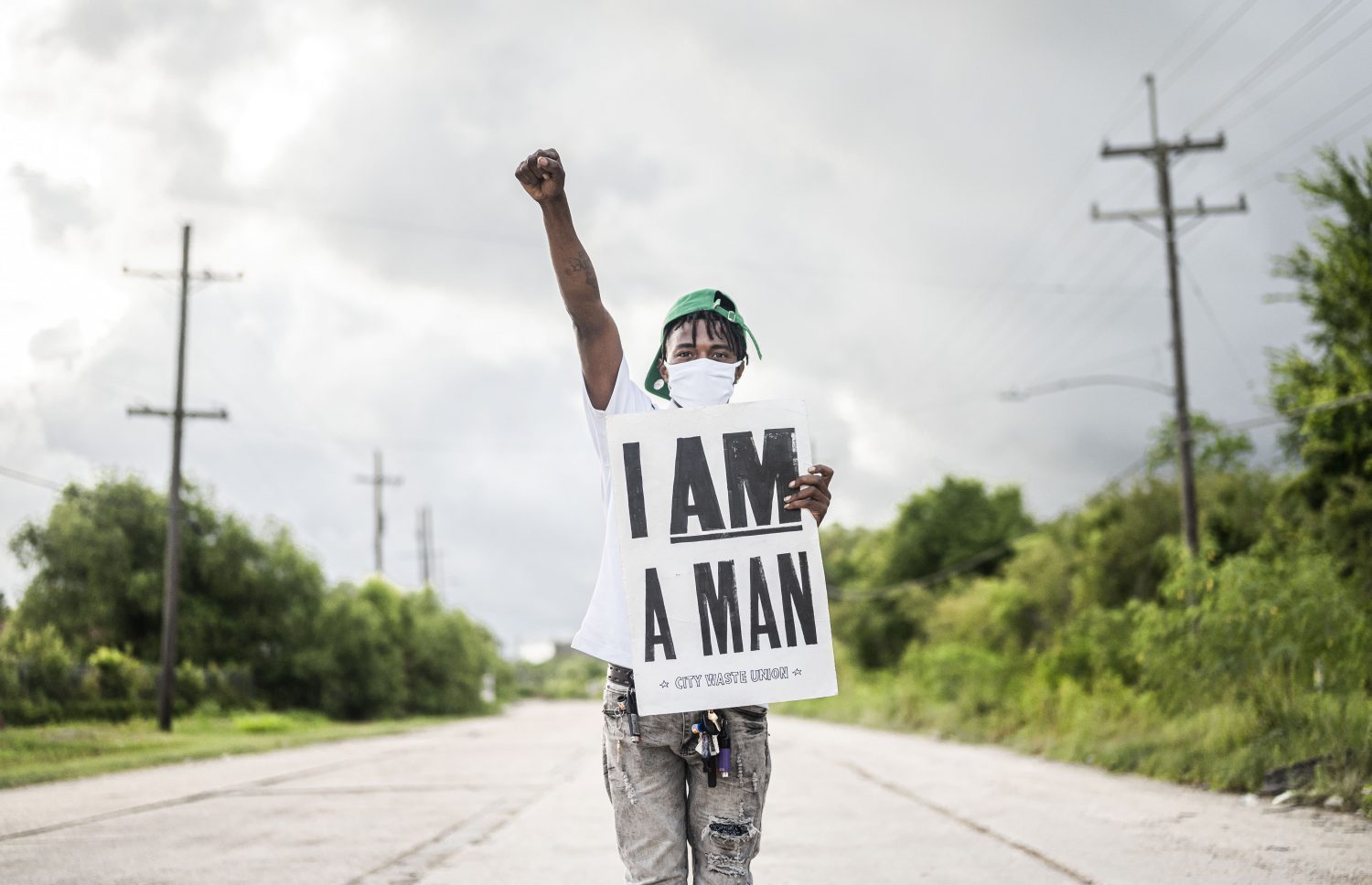
Diorama of Memphis Sanitation Workers’ Strike – National Civil Rights Museum – Downtown Memphis
https://search.creativecommons.org/photos/4ad146c0-cb8a-4fa9-acb8-1a5d636fbf32
(Photo by Adam Jones)
Since early May, a group of New Orleans sanitation workers, the “hoppers” who, as their job title would suggest, hop on and off garbage trucks, have been on strike. Eerily reminiscent of the Memphis sanitation workers’ strike in 1968, the national fight for the valuation and dignity of black lives and black bodies has New Orleans sanitation workers standing up for their worth. All of the hoppers are black. Contracted by the city through a private company, PeopleReady, hoppers are paid $10.25 an hour, (a non-living wage,) to pick up potentially contaminated trash—rain or shine. As contract workers, they receive no benefits, no sick leave, no paid time off. And yet, during the early months of quarantine, they were the backbone of our city; ensuring that the streets stayed clean and lessening the spread of germs and the COVID-19 virus. The strikers have a list of demands: hazard pay in recognition of the essential and dangerous quality of their work, proper distribution of personal protective equipment, a living wage of $15 per hour, and better working conditions, including trucks that don’t leak hazardous chemicals on them during the job. According to VICE News, hoppers have the fifth most dangerous job in the country.
We are living through a unique cultural moment: as our global society battles an airborne pandemic and adjusts to a completely new way of existing, in the United States, we are living through a period of civil unrest: a Civil Rights movement unique in nature to any we have seen before in this country. Our country has never valued black life for more than their productive value. Case in point: two weeks into the hoppers’ strike, Metro Service Group outsourced state work-release prison laborers through a private company, Lock LLC, to replace the men who refused to come to work. The contracted prisoners were paid even less than the strikers: $9.25 an hour. With one of the highest incarceration per capita rates in the country, Louisiana has a deep history of exploitation of prison labor that pre-dates the Civil War. Two years ago, prisoners at Angola went on strike, covered by The Appeal, against the inhumane and unpaid labor they are forced do. Without digressing too far into the prison-industrial labor complex and the ways in which incarceration serves to maintain white domination and suppress people of color, Metro Service Group sent a clear message with their move to hire prisoners: black bodies are replaceable, undeserving of recognition of their labor, and only as good as the value they can provide.
Tasked with the tall responsibility of maintaining the safety of our community during a pandemic, New Orleans sanitation workers receive little in the way of recognition. Should they fall ill from exposure on the job, they would be forced to pay for treatment out of pocket. On a $10.25 an hour wage, you can imagine the bind that this creates. If the hoppers refuse to work until they are compensated for their value, the city will replace them with someone who will work (or be forced to work,) for less. If the hoppers continue to work, they are completely unprotected, potentially endangering their family members, and left without medical coverage should they contract COVID-19 on the job. Damned if they do, damned if they don’t. This assault on the hoppers’ bodily and financial autonomy is a human rights violation.
The sanitation workers’ strike and the Black Lives Matter movement may seem like separate issues, but they both boil down to the cry for recognition of institutionalized and systematic racism and take a stand against the devaluation of black lives and bodies in this country. White dominance and the ugly racial power hierarchy that exist in the United States don’t only become evident when innocent black men and women are murdered in the streets, killed by police officers in the name of “community protection.” We must also recognize the racism that exists in the way that we treat and entrap blue-collar workers in this country: confining those who are already socioeconomically disadvantaged to a non-powerful underclass struggling to survive. (In the name of “community protection.”)

Photos: New Orleans sanitation workers strike for protections and better pay
https://southerlymag.org/2020/06/17/photos-new-orleans-sanitation-workers-strike-for-protections-and-better-pay/
(Photo by: Katie Sikora)
In their picket lines, the Metro Service Group strikers have embraced a slogan from the 1968 Memphis sanitation workers’ strike that was in part, popularized by Martin Luther King Jr.: “I Am a Man.” Our country has not come far since the men in Memphis stood up for their dignity and the value of their life. The New Orleans sanitation workers’ strike is a labor dispute, yes, but it is also a racial fight. Their demands may be for the essential, frontline-worker nature of their job to be recognized and compensated, but more than this, their demands are for respect and dignity.
Resources for Support:
References:
 NOLAbeings
Multimedia artist Claire Bangser created NOLAbeings as a portrait-based story project that marries...
NOLAbeings
Multimedia artist Claire Bangser created NOLAbeings as a portrait-based story project that marries...
 Data corner: Adobe Suite (create a PDF, social media graphic, presentation, edit a photo and video
Data corner is where you go to work with analytics and top tech skills. It takes on everything from PERL and SQL to Canva and Sprout Social.
Data corner: Adobe Suite (create a PDF, social media graphic, presentation, edit a photo and video
Data corner is where you go to work with analytics and top tech skills. It takes on everything from PERL and SQL to Canva and Sprout Social.
